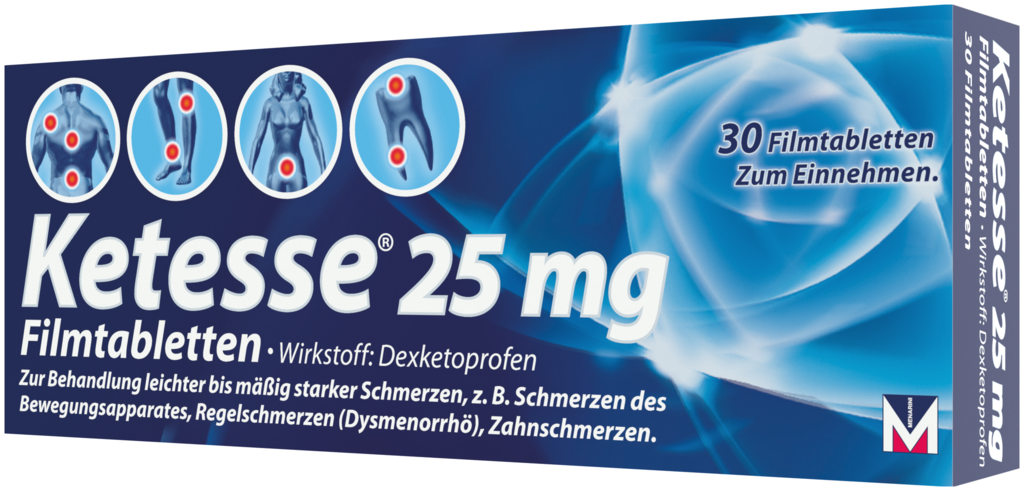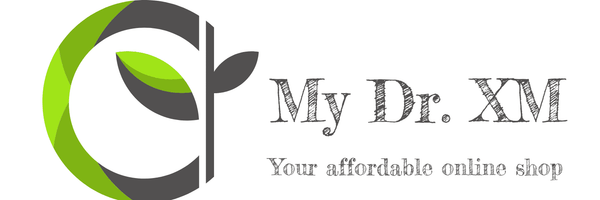Menarini Pharma
Ketesse 25 mg 30 film-coated tablets
Ketesse 25 mg 30 film-coated tablets
Couldn't load pickup availability
Ketesse is a pain-relieving medicine from the group of so-called non-steroidal anti-inflammatory drugs (NSAIDs, painkillers and anti-inflammatory drugs).
Ketesse is used for the symptomatic treatment of mild to moderate pain, e.g. B. Pain in the musculoskeletal system, period pain (dysmenorrhea), toothache.
If you don't feel better after 3-4 days or even feel worse, contact your doctor.
Contraindications
Ketsesse must not be taken
- if you are allergic to dexketoprofen or any of the other ingredients of this medicine listed in section 6,
- if you are allergic to acetylsalicylic acid or other non-steroidal anti-inflammatory drugs,
- if you suffer from asthma or asthma attacks after taking acetylsalicylic acid or other NSAIDs, acute allergic rhinitis (a short-term inflammation of the nasal mucosa), nasal polyps (allergy-related ulcers in the nose), hives (skin rash), angioedema (swelling of the face, eyes , on the lips or on the tongue or have suffered from shortness of breath) or wheezing,
- if you have ever suffered from photoallergic or phototoxic reactions (a certain form of redness/blistering of areas of skin exposed to sunlight) during treatment with ketoprofen (an NSAID) or fibrates (medicines used to lower blood fat levels),
- if you have a stomach/duodenal ulcer or gastrointestinal bleeding or if you have suffered from a gastrointestinal bleeding, a gastrointestinal ulcer or a gastrointestinal breakthrough (perforation) in the past,
- if you suffer from chronic digestive disorders (e.g. upset stomach, heartburn),
- if you have ever suffered from gastrointestinal bleeding or a gastrointestinal perforation due to previous use of non-steroidal pain and anti-inflammatory drugs (non-steroidal anti-inflammatory drugs, NSAIDs),
- if you suffer from certain chronic inflammatory bowel diseases (Crohn's disease, ulcerative colitis),
- if you suffer from severe heart failure, moderate to severe kidney dysfunction or severe liver dysfunction,
- if you suffer from bleeding problems or a blood clotting disorder,
- if you are severely dehydrated (significant loss of fluid from the body), e.g. B. due to vomiting, diarrhea or insufficient fluid intake,
- if you are in the last three months of pregnancy or are breastfeeding.
Interactions
Taking Ketesse with other medicines
Tell your doctor or pharmacist if you are taking, have recently taken or might take any other medicines, even if they are taken without a prescription. There are some medicines that should not be taken/used together or whose dosage may need to be adjusted if taken/used together.
Always tell your doctor, dentist or pharmacist if you are taking any of the following medicines in addition to Ketesse:
Combinations that are not recommended:
- Acetylsalicylic acid, corticosteroids or other anti-inflammatory drugs
- Warfarin, heparin or other anticoagulant medicines
- Lithium: used to treat certain types of depression
- Methotrexate (anticancer medicine or immunosuppressant), used in high doses above 15 mg/week
- Hydantoin and phenytoin: used for epilepsy
- Sulfamethoxazole: used for bacterial infections
Combinations requiring careful use:
- ACE inhibitors, diuretics and angiotensin II receptor antagonists (used to lower blood pressure and for heart problems)
- Pentoxifylline and Oxpentifylline: are used for chronic venous ulcers
- Zidovudine: used to treat viral infections
- Aminoglycoside antibiotics: used for bacterial infections
- Sulfonylureas (e.g. chlorpropamide and glibenclamide), used to treat diabetes
- Methotrexate, used in low doses of less than 15 mg/week
Combinations that need to be carefully checked:
- Quinolone antibiotics (e.g. ciprofloxacin, levofloxacin): are used for bacterial infections
- Ciclosporin and tacrolimus: are used to treat immune diseases and in organ transplants
- Streptokinase and other thrombolytic or fibrinolytic medicines: are used against thrombosis (blood clots).
- probenecid: used for gout
- Digoxin: used to treat chronic heart failure
- Mifepristone: used as an abortifacient
- Antidepressants of the SSRI type (selective serotonin reuptake inhibitors)
- Platelet aggregation inhibitors: are used to prevent thrombosis (blood clots).
- Beta blockers, used to treat high blood pressure and heart problems
- Tenofovir, deferasirox, pemetrexed
If you have any doubts about taking other medicines with Ketesse, ask your doctor or pharmacist.
Taking Ketesse with food and drink
Take the tablets with an appropriate amount of water. Take the tablets with food as this helps reduce gastrointestinal side effects. However, if you suffer from acute pain, take the tablets on an empty stomach (at least 30 minutes before eating) as this will speed up the drug's onset of action.
Pregnancy, breast-feeding and fertility
Ketesse must not be taken in the last three months of pregnancy or while breast-feeding. If you are pregnant or breast-feeding, think you may be pregnant or are planning to have a baby, ask your doctor or pharmacist for advice before taking this medicine as Ketesse may not be the right medicine for you.
The use of Ketesse is not recommended in women planning to become pregnant or who are pregnant. Treatment may only be carried out at any time during pregnancy on the instructions of a doctor.
The use of Ketesse is not recommended when trying to become pregnant or during infertility tests.
Regarding the possible effects on female fertility, see also Section 2. “Warnings and Precautions”.
Ketesse contains sodium
This medicine contains less than 1 mmol sodium (23 mg) per film-coated tablet, meaning it is almost “sodium-free”.
Driving and using machines
Warning: This medicine may impair the ability to react and drive.
Ketesse may have a slight influence on the ability to drive and use machines, as dizziness and drowsiness may occur after taking it. If you experience these side effects, do not drive or use machines until the symptoms have subsided. Ask your doctor for advice.
Application
Always take this medicine exactly as described in this leaflet or exactly as your doctor or pharmacist tells you. Check with your doctor or pharmacist if you are unsure.
The lowest effective dose should be taken for the shortest duration necessary to relieve symptoms. If you have an infection, consult a doctor immediately if symptoms (e.g. fever and pain) persist or worsen (see section 2).
The generally recommended dose is 1 tablet (25 mg) every 8 hours, up to a maximum of 3 tablets daily (75 mg).
If there is no improvement after 3-4 days or your condition worsens, contact your doctor. Your doctor will tell you how many tablets you need to take every day and for how long. The dose of Ketesse you need depends on the type, severity and duration of your pain
If you are elderly or have kidney or liver problems, start treatment with a total daily dose of 2 tablets (50 mg). If Ketesse is well tolerated, this initial dose may later be increased to the generally recommended dose (75 mg) in elderly patients.
For faster relief of severe pain, take the tablets on an empty stomach (at least 30 minutes before eating) as they are then more easily absorbed by the body (see section 2. “Taking Ketesse with food and drink”).
Use in children and adolescents
This medicine is not recommended for children and adolescents under 18 years of age.
Side effects
Like all medicines, this medicine can cause side effects, although not everyone gets them.
Possible side effects are listed according to the likelihood of them occurring.
Common side effects (may affect up to 1 in 10 people)
nausea and/or vomiting, abdominal pain predominantly in the upper quadrants, diarrhea and indigestion (dyspepsia).
Uncommon side effects (may affect up to 1 in 100 people):
vertigo, dizziness/lightheadedness, sleepiness, difficulty sleeping, nervousness, headache, palpitations, flushing, inflammation of the stomach lining (gastritis), constipation, dry mouth, flatulence, rash, fatigue, Pain, chills and feeling feverish, general malaise.
Rare side effects (may affect up to 1 in 1,000 people)
peptic ulcer, bleeding or perforation in the gastrointestinal area (recognizable as vomiting blood or tarry stools), fainting, high blood pressure, slow breathing, fluid retention in the tissues and peripheral swelling (e.g. swollen ankles), swelling of the larynx, loss of appetite (anorexia), abnormal sensations, hives (itchy skin rash), acne, increased sweating, back pain, increased urination, menstrual disorders, prostate problems, abnormal values in liver function tests (blood tests), liver cell damage (hepatitis), acute kidney failure.
Very rare side effects (may affect up to 1 in 10,000 people)
Anaphylactic reaction (hypersensitivity reaction that can lead to collapse), open sores on the skin, mouth, eyes and intimate areas (Stevens-Johnson and Lyell syndrome) , facial swelling or swelling of the lips and throat (angioedema), shortness of breath due to narrowed airways (bronchospasm), shortness of breath, fast heartbeat, low blood pressure, inflammation of the pancreas, blurred vision, ringing in the ears (tinnitus), sensitive skin, hypersensitivity to light, itching, kidney problems, decreased Number of white blood cells (neutropenia), reduced number of platelets (thrombocytopenia).
Tell your doctor immediately if you notice any gastrointestinal side effects (e.g. stomach pain, heartburn or bleeding) at the start of treatment or if you have previously suffered from any of these side effects as a result of long-term treatment with anti-inflammatory drugs, especially if you are older.
Stop taking Ketesse immediately if you notice a rash or sores in the mouth or genital area, or other signs of allergy.
Fluid retention and swelling (especially of the ankles and legs), increased high blood pressure and heart failure have been reported during treatment with NSAIDs.
The use of medicines such as Ketesse may be associated with a slightly increased risk of having a heart attack or stroke.
In patients with certain immune disorders that affect connective tissue (systemic lupus erythematosus or mixed connective tissue disease), anti-inflammatory drugs may rarely cause fever, headache, or stiff neck.
The most frequently observed side effects involve the digestive tract. Stomach or duodenal ulcers (peptic ulcers), perforation (perforations) or bleeding, sometimes fatal, may occur, especially in older patients. Nausea, vomiting, diarrhea, flatulence, constipation, indigestion, abdominal pain, tarry stools, hematemesis, ulcer-like inflammation of the oral mucosa, worsening of colon inflammation or Crohn's disease have been reported after use. Inflammation of the stomach lining (gastritis) has been observed less frequently.
As with other NSAIDs, hematological reactions can occur (small patches of bleeding into the skin, subcutaneous tissue or mucous membranes, anemia due to the reduction of the blood-forming bone marrow or the breakdown of red blood cells [aplastic or hemolytic anemia] and, rarely, severe reduction of the white blood cells [agranulocytosis] or reduction of the bone marrow [medullary hypoplasia]).
composition
The active ingredient is dexketoprofen (as dexketoprofen trometamol).
Each film-coated tablet contains 25 mg dexketoprofen.
The other ingredients are:
Tablet core: corn starch, microcrystalline cellulose, carboxymethyl starch sodium, glycerine distearate.
Film coating: dry varnish (consisting of hypromellose, titanium dioxide, macrogol 6000), propylene glycol.
Usually ships out within 3-4 business days
Share


